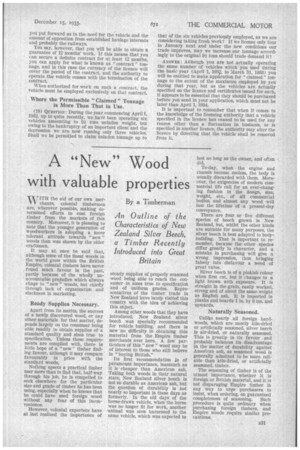A "New'' Wood with valuable properties
Page 49

If you've noticed an error in this article please click here to report it so we can fix it.
By a Timberrnan
An Outline of the Characteristics of New Zealand Silver Beech, a Timber Recently Introduced into Great Britain
WITH the aid of our own merchants, colonial timbermen are, wherever possible, making determined efforts to oust foreign timber from the markets of this country. Moreover, it is pleasing to note that the younger generation of woodworkers is adopting a more tolerant attitude towards " new " woods than was shown by the older craftsmen.
It may at once be said that, although some of the finest woods in the world grow within the British Empire, colonial timbers have never found much favour in the past, partly because of the wholly tinaccountable prejudice which always clings to " new " woods, but chiefly through lack of organization and slackness in marketing.
Ready Supplies Necessary.
Apart from its merits, the success of a newly discovered wood, or any other materials, for that matter, depends largely on the consumer being able readily to obtain supplies of a standard quality and sizes true to specification. Unless these requirements are complied with, there is little hope of a " new " timber finding favour, although it may compare favourably in price with the standard woods, Nothing upsets a practical timber user more than to find that, half-way through his job, he Is compelled to seek elsewhere for the particular size and grade of timber he has been using, especially when he knows that he could have used foreign wood without any fear of this inconvenience.
However, colonial exporters have at last realized the importance of steady supplies of properly seasoned wood being able to reach the consumer in sizes true to specification and of uniform grades. Representatives of the timber trade in New Zealand have lately visited this country with the idea of achieving this object.
Among other woods that they have Introduced, New Zealand silver beech was specially recommended for vehicle building, and there is now 'no difficulty in obtaining this material from the Empire timber merchants over here. A few particulars of this " neW " wood may be of interest to those who still believe In "buying British."•
Its first recommendation Is of paramount importance, inasmuch as it is cheaper than American ash. Taking both woods in their natural state, New Zealand silver beech is not so durable as American ash, but the question of durability is not nearly so important in these days as formerly. In the old days of the horse-drawn vehicle, when the horse was no longer fit for work, another ranimal was soon harnessed to the same vehicle, which was expected to last as long as the owner, and often did.
To-day, when the engine and chassis become useless, the body is usually discarded with them. Moreover, the exigencies of modern commercial life call for an ever-changing fashion in the design, size, weight, etc., of all commercial bodies, and almost any wood will last the lifetime of a present-day conveyance.
There are four or five different species of beech grown in New Zealand, but, whilst the other kinds are suitable for many purposes, the silver beech is best adapted to bodybuilding. That is important to remember, because the other • species differ greatly in character, and a mistake in purchasing will give a wrong impression, thus bringing falsely into disfavour a wood of great value.
Silver beech is of a pinkish colour when first cut, but it changes to a light brown with exposure. It is straight in the grain, easily worked, strong and of about the same weight as English ash. It is imported in planks and boards 1 in. by 0 ins, and upwards.
Naturally Seasoned.
Unlike nearly all foreign hardwoods, which are mostly kiln-dried or artificially seasoned, silver beech Is air-dried, or naturally seasoned. This is greatly in its favour and probably balances its disadvantage in the matter of durability against American ash, as seasoned wood is generally admitted to be more reliable than kiln-dried, or artificially seasoned, timber.
The seasoning of timber is of the utmost importance, whether it is foreign or British material, and it is not disparaging Empire timber in any Way to urge purchasers to insist, when ordering, on guaranteed completeness of seasoning. Such procedure is quite ordinary when purchasing foreign timbers, and Empire woods require similar precautions.




































































































